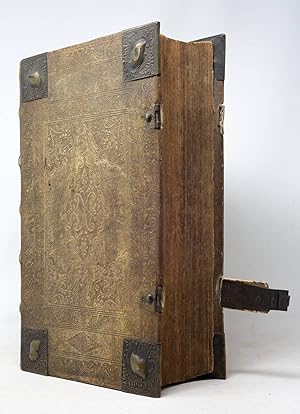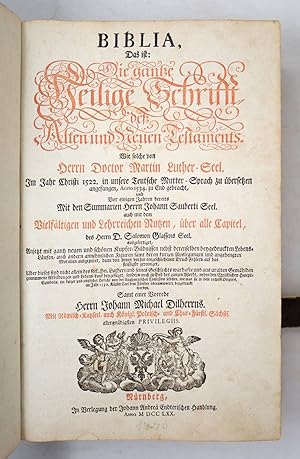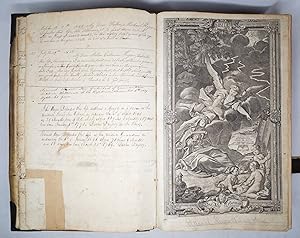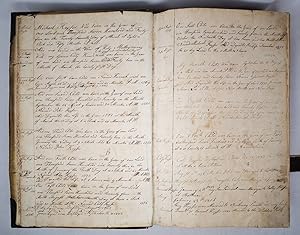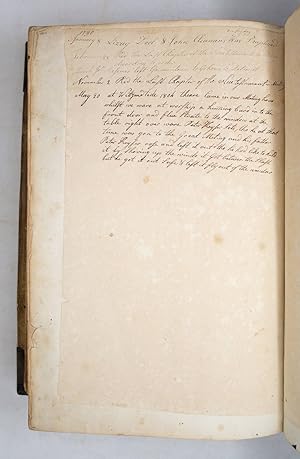Beschreibung
Nuremberg: Johann Andreas Endter s heirs, 1770. Folio in 4s and 6s (14 13/16" x 9 9/16", 377mm x 242mm). [Full collation available.] With 19 engravings, of which 17 are integral to the text, 2 as frontispieces (one to the general title, one to the New Testament). Bound in contemporary clasped and bossed blind-tooled paneled alum-tawed pig-skin over beveled boards. On the spine, five raised bands. Purple paste-paper paste-downs. Rubbed at the spine. Upper clasp perished, lower clasp frayed. Some passages of moderate tanning, but on the whole quite a clean copy. Wear and splits (some with old repairs) to the end-papers at the clasp-marks. Pressed leaves at F3.4, Rr3.4, Yyy6-Zzz1 and Llll6-Mmmm1. Ink marginalia to Hhhhh2 (the beginning of the Augsburg Confessions). Ink purchase note of Michael Keyser ("bought this book of Peter Leibert in the year 1775 Price £2-7S-d") with Michael Keyser repeated in graphite on the recto of the first free end-paper. Ink birth, baptism, marriage and death records of the Keyser family from the verso of the first free end-paper to the verso of the second free end-paper, with a final graphite record (dated 1850) to the verso of the second free end-paper. Graphite ownership signature of Elkanah Keyser (Rising Sun) to the general frontispiece and to the New Testament fly-title (Hhhh1r, p. 913). Bifolium tipped in between the two rear end-papers, written on the verso of the first leaf, recounting events of the year 1790. Eight page "Concordantz-Register" in plain sewn wraps laid in. Although Christoph Sauer in 1743 published the first German bible in America (and the first in any European language; the first was Eliot's Algonquin bible in 1663), he surely could not supply enough for the burgeoning ranks of German-speaking immigrants in and around Germantown. "Immigrant bibles" such as this -- known sometimes as an Elector Bible (Kurfürstenbibel) or Weimar Bible for the table of Electors at the beginning -- will have been prized possessions brought or ordered from Germany. Nearly all were Luther's translation, as is specified in the lengthy title of the present item. This is a profoundly luxurious edition, with hundreds of wood-cuts integral to the text, 19 copper-plate engravings, registers, concordances, chronologies, prefaces, biographies and Melanchthon's Augsburg Confessions; in short, it is a whole world of Christian worship between substantial and ornate covers -- bossed to prevent the book proper from touching the ground. The volume must have traveled from Nuremberg to the New World shortly after its publication; Michael Keyser (27 March 1745-5 October 1825) bought the volume in 1775 from Peter Leibert (£2/7/1 has a 2021 value of over £300), his Germantown neighbor (both men owned several parcels in central Germantown). Leibert was a bookbinder and bookseller who worked with Christoph Sauer. With his son-in-law Michael Billmeyer, Leibert published a German translation of the Pennsylvania General Assembly as well as a biweekly local newspaper, the Germantauner Zeitung. From 1775 the bible remained in the Keyser family through at least 1850. As often, the end-leaves of the bible were used as a record of important times in a family. Many birth-records (nine children in total are recorded as having been born to Michael Keyser by his wife Caty (née Knor)) are followed shortly by death-records. The Keysers being Anabaptists, baptisms are often recorded later in life (several in 1803). The hand recording the death of Michael Keyser is different but unspecified; likely it is that of John Keyser (Michael and Caty's first son who survived to adulthood, b. 1772). Elkanah Keyser, who signed the bible twice prominently, was John's son, and occupied his home at the Rising Sun, an Inn at the intersection of the Germantown and York roads, now demolished. The account inserted between the two rear end-papers is curious. It begins in 1790 recording a baptism but ends with an extraordinary augurial account. Bestandsnummer des Verkäufers JLR0402
Verkäufer kontaktieren
Diesen Artikel melden
![]()
